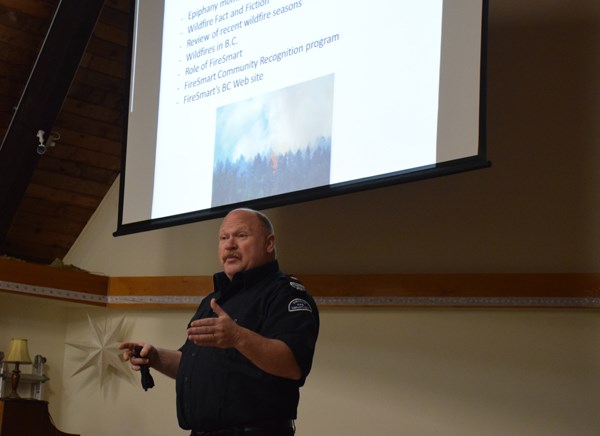The Town of Gibsons is hoping residents will take on the challenge of making their neighbourhoods FireSmart to help protect the community from the potentially devastating consequences of an interface wildfire.
The Town brought together Sunshine Coast Regional District (SCRD) manager of protective services Matt Treit, Gibsons Fire Department and SCRD fire prevention officer Rick Ruth and consultant Silas White for a community dialogue on FireSmart and wildfire protection March 10.
Mayor Bill Beamish opened the session by saying that as well as wanting residents to look at what they can do at their homes, the Town also has work to do on its properties like the Charman Creek Lands, a natural wooded area in the centre of Gibsons.
Some of that work could be done under a “community wildfire protection plan” that the SCRD recently received a $114,850 grant for.
Treit said the SCRD hopes to start the search next week for a contractor to start drafting the plan.
Ruth told the audience that firefighters and other experts know wildfires, most of which in B.C. are still started by lightning, are inevitable.
“It’s part of the ecological system, it’s going to happen – that forest is going to burn. It’s not if, it’s when,” he said, adding that for municipal firefighters the focus isn’t on what can be done to fight the fire in the forest but on protecting the community and local neighbourhoods.
In an hour-long presentation, Ruth said that in the recent California wildfires as many as 700 homes caught fire in an hour, far more than a municipal fire department could cope with.
“The whole idea here is prevention,” he said, calling the FireSmart program “the most effective way to protect our community and the cheapest way.”
At the interface fire can jump from the forest to the homes, Ruth explained, but it doesn’t usually happen as a fast-moving wall of flame rolling through a neighbourhood but by embers that could be from a wildfire several kilometres away.
“You can try to stop it up there [on the mountain], but our community is still vulnerable,” said Ruth.
Ruth illustrated the science behind the FireSmart principles with a dramatic video of tests on different building and landscape materials exposed to a shower of small embers.
Combustible plants around the test home and debris like leaves or dry branches on the roofs and in the rain gutters caught fire. The sections of the home with wood siding or shake roofing burned, but despite the large number of sparks falling, roofs with fire-resistant shingles didn’t ignite and neither did walls with concrete-based siding.
“What really hurt 50 per cent of the homes was an area of about five feet around that home, and if you cared for that area those homes would survive and it’s a very simple thing to do.”
Ruth said they’ve found to best way to get people to make their properties FireSmart is through “a grassroots approach” at the neighbourhood level, and he encouraged people to take advantage of the support the FireSmart program offers.
He said it typically starts with having someone willing to get involved as “a champion for the neighbourhood.”
Ruth works with that person to create a wildfire hazard assessment for the area and bring together others willing to take on the work to make the neighbourhood FireSmart.
“They create priorities and achievable goals in their community … then they take this and say, ‘Let’s do three things – three small, one-day things,” he said.
FireSmart BC can provide up to $500 per year to help with the costs of organizing events around that list of three priorities.
“If you’ve got people in this community working on their homes, they’re effectively a fire break all on their own. If their house doesn’t catch on fire, your home doesn’t catch on fire.”
“I think we have some potential champions sitting here to spread the word and engage in this concept of being a FireSmart community,” said White, who is working with the Town through the consulting firm Impact Resolutions.
White said as part the grant the Town received to hold the March 10 event there are also funds available to help with neighbourhood-level FireSmart work or events on top of the $500 FireSmart BC offers.



